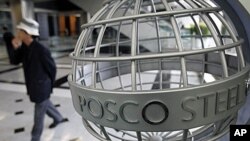India's recent approval of a South Korean company establishing a giant steel plant is being seen as a business-friendly signal by one of the world’s fastest growing economies. The $12 billion project is the biggest foreign investment project in the country and could ease concerns among foreign investors facing hurdles over planned investments.
When Posco - the world’s third largest steelmaker - proposed establishing a steel mill in eastern Orissa state, in 2005, it had hoped to begin rolling steel this year.
But the future of the country’s single biggest foreign investment project became uncertain following protests by local farmers and fishermen who will be displaced by the steel plant. Campaigners say it will damage their plantations and forest-based livelihood.
Last year, a panel established by the government suggested scrapping environment clearances given to the project.
After a delay of six years, the environment ministry recently approved Posco’s steel plant, saying projects like these have economic, technological and strategic significance for India. It set new conditions to limit ecological damage.
The South Korean company now hopes to begin work on the steel plant as soon as the Orissa government hands over the land.
The Posco project is seen as a test case for foreign investors wanting to capitalize on opportunities offered by India’s growing economy, but delayed by the maze of regulations that often result in huge stumbling blocks.
Economist D.H. Pai Panandiker heads the independent think tank, RPG Goenka Foundation. He says foreign investors want more clarity on policies.
"I think there is serious need for looking at foreign investment policy so that investment becomes easy. The policy should be absolutely clear cut and should not lead to any change of mind later on,” he said. “To create confidence among the foreign investors it is absolutely necessary that a rule once laid down should never be violated."
Posco’s plant is just one among several big industrial projects which have encountered problems. Several companies wanting to establish mining projects, steel mills and power plants are confronting hurdles usually related to land acquisition and environment clearance. The delays have prompted the Central Bank to say that India must shorten approval time for projects.
But that is not proving to be easy. Farmers resist giving up their land for industry because resettlement is not easy. Damage to the environment is getting more attention by India’s environment ministry.
The government, which has been wooing foreign investment to create much-needed infrastructure, hopes the clearance given to Posco will reassure foreign investors that the country is serious about tackling these issues.
Montek Singh Ahluwalia is a senior official in the government’s top planning body, the Planning Commission. He says solutions will have to be found so that India can go ahead with planned investments.
"The approach should be one of problem-solving rather than simply rigidly taking a particular stand. Mining projects, all over the world, they put some pressure on the environment, but there are some corrective steps that can be taken to minimize those pressures and that is the way we should go about it," Ahluwalia states.
Many believe that the clearance given to Posco will be seen as a business-friendly signal. However, others warn that Posco is not the last project which has faced hurdles as it seeks to enter India.
Anjan Roy is chief economist at the Federation of Indian Chambers of Commerce and Industry. He says this part of a process in which India is seeking to balance the demands of a growing economy with that of a primarily rural population.
“There might be delays, but ultimately I suppose it is fair play because here we do not ignore the rights of tribal or forest people,” Roy said. “We do believe environment is very important. So one has to maintain a kind of balance between environmental demands and demands of development, job creation."
For the time being the controversies surrounding big industrial projects appear to have slowed down investment in the country. Despite the country’s attractiveness as one of the world’s fastest growing economies, foreign direct investment in the country dipped last year by nearly one third. The $ 24 billion which India attracted were lesser than investments in countries like Singapore.




